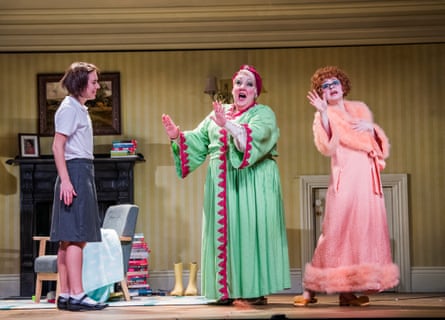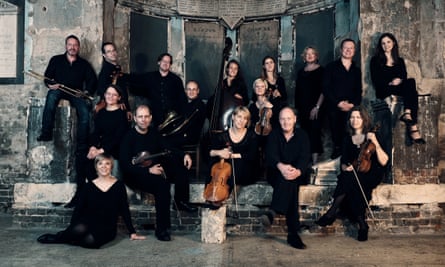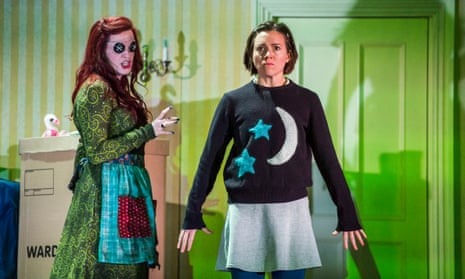Discovering your parents have shrunk to tiny figures locked in a snow globe is scary as well as inconvenient. This is the fate of Coraline in Neil Gaiman’s 2002 fantasy children’s novel of the same name, later a popular film and now an opera by Mark-Anthony Turnage to a libretto by the playwright Rory Mullarkey. The 11-year-old girl rescues Mum and Dad from a parallel world where eyes are replaced with buttons and all is evil. Her bravery wins the day, a lesson for all.
Turnage (b1960) has tackled opera in every variety and scale: Oedipal teen angst (Greek), wartime trauma (The Silver Tassie), domestic violence (Twice Through the Heart) and the sorrows of a Playboy model (Anna Nicole). Coraline, a Royal Opera House commission, is his first family endeavour, though the composer resists that label. After a schools’ matinee alive with the giggles and shrieks of fully engaged children, and a first night at the Barbican theatre in which an abnormal – no other word – number of pre-teens were in attendance, “family opera” is a fair description.
Halfway into the long first act, the pace seemed slow, the text too wordy. The question of who this new-format Coraline was aimed at began to vex. At a sudden spooky moment on stage, a scatter of gasps sounded, so spontaneous and noisy, I had the answer. Children will wriggle in anything lasting longer than 10 minutes even if they quite enjoy it, just as parents will squirm at the realisation that a two-hour opera is quite an ask. You can only gauge success by the entire audience response, which was warm and cheerful.
Gaiman’s book ripples with literary quotes, whether or not they brush off on a child reader, and nods at other virtual worlds: Alice, Hansel and Gretel, CS Lewis and the brothers Grimm. This richness is lost in an opera, where immediacy of action must take precedence. Aletta Collins’s production, with a clever set by Giles Cadle full of revolves and sliding doors, provided witty gags and effects, conveying the power of live theatre for children born into a digital age.
Turnage’s score, for 16 players, coloured by piano, celeste, harp, vibraphone and marimba, emphasised jazzy rhythms, snatched melody and waltz. Short vocal lines were picked up by orchestral response. In the absence of arias or ensembles (amplified offstage voices aside), this created an easy-to-follow musical coherence. If there were echoes of Stravinsky, Henze and Turnage’s teacher, Oliver Knussen, they were brief homages rather than stealings. Turnage has his own strong voice.
Do we notice the music enough? On first hearing, only just. Full concentration is needed to hear the words. (Hearing it twice more, I found the problem receded hugely.) The composer, and one can sympathise, wanted the text to be audible without surtitles. The clarity of the singers was faultless. Yet brain and ear, wanting to follow the story’s every twist and turn, tended to suppress the music, except in those sparky, purely orchestral passages when characteristic Turnage sounds hove into view. A glance at surtitles to get the sense would have released us, made us fully available to the music. Most children present were old enough to manage this.

The fine cast was led by Mary Bevan (Coraline), touching and persuasive but, with her soprano tone now becoming so resonant, quite a grown-up 11-year-old, with Kitty Whately and Alexander Robin Baker beadily chameleon in their switch from lovable if dreary mum and dad to horrific “other” parents. Gillian Keith and Frances McCafferty added humour as unretirable actresses. Members of the Britten Sinfonia made crisp, precise work of the score. Sian Edwards conducted energetically and winningly. Coraline, a co-production, now travels to Lille, Freiburg, Stockholm and Melbourne. With some text trims and – whisper it – judicious use of surtitles, it could triumph.
The Britten Sinfonia was one of a star lineup of performers at St John’s Smith Square, where Tenebrae’s artistic director, Nigel Short, had programmed this year’s Holy Week festival. Paul McCreesh and his Gabrieli Consort and Players brought period-instrument intimacy and chamber-sized vitality to Bach’s B minor Mass. On a larger scale, the Britten Sinfonia joined conductor Stephen Layton and his choir, Polyphony, in Bach’s St John Passion, with the tenor Nick Pritchard a supple, lucid Evangelist.

The forbidding opening chorus, in which the oboe (Nicholas Daniel) pushes long, insistent lines through the choppy turbulence of the orchestra, never ceases to astound and disturb. The mix of biblical text and Lutheran interpolation has made the St John Passion controversial, especially in America, some judging it antisemitic. The issues, complex and unresolved but all too current, are aired in Michael Marissen’s 2016 book Bach and God.
The festival’s novelty was The Sealed Angel by the Russian-Lithuanian composer Rodion Shchedrin (b1932), sung by the superbly drilled choir of King’s College London, directed by Joseph Fort. This bold, ecstatic work for unaccompanied choir and flute, full of flowing angels, angry outburst and eventual redemption, relates a tale of old believers who try to save their village icon. Using a story by Leskov (author of Lady Macbeth of Mtsensk, Shostakovich’s once banned adaptation of which returns to the Royal Opera House this week), Shchedrin dared to write this overtly religious work in 1988, in Gorbachev’s Soviet Russia, a regime about to end. Sects and faiths come and go, but music in itself has a force to outlast them all.
Star ratings (out of 5)
Coraline ★★★★
Holy Week festival ★★★★

Comments (…)
Sign in or create your Guardian account to join the discussion